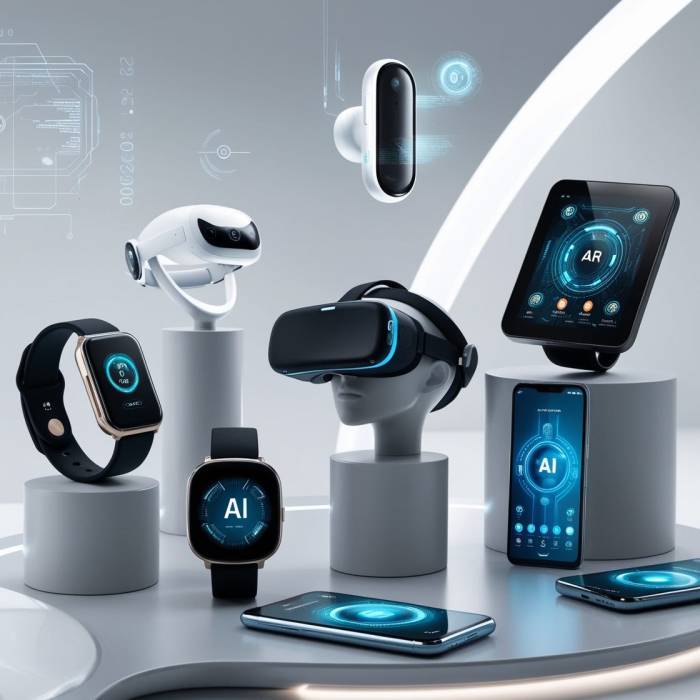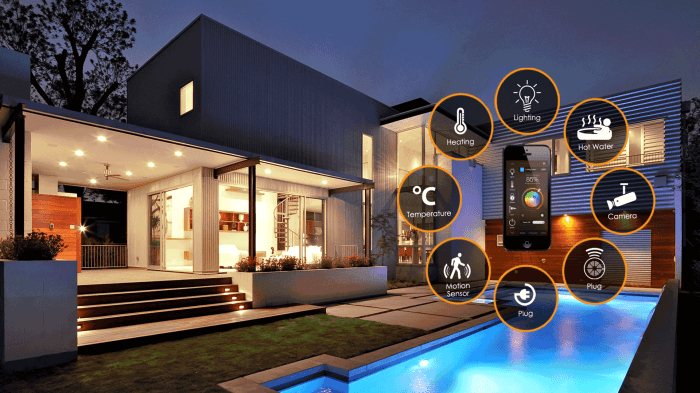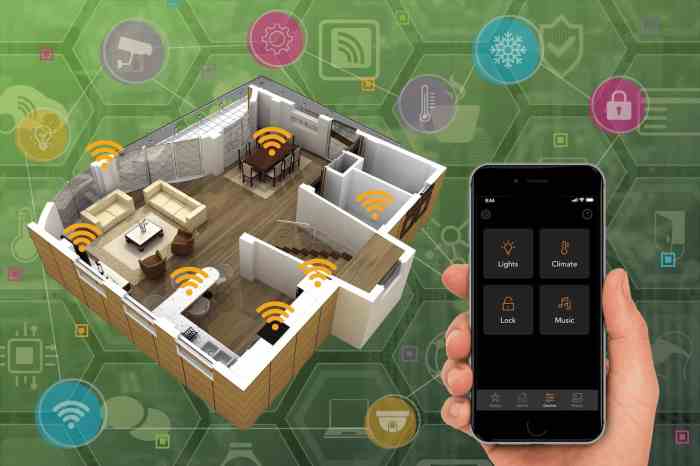Best home automation gadgets for 2025 are transforming how we live, offering unprecedented convenience and control. From smart lighting systems that adapt to your daily rhythm to voice-activated assistants managing your entire home network, the possibilities are expanding rapidly. This exploration delves into the most innovative and impactful devices poised to shape the future of home automation.
We’ll examine key features, consider ease of use, and weigh the value proposition of each gadget, providing a comprehensive guide to help you select the perfect additions for your smart home. Whether you’re a seasoned tech enthusiast or a newcomer to the world of home automation, this guide aims to simplify your decision-making process.
The smart home revolution continues to accelerate, bringing increasingly sophisticated and user-friendly automation gadgets into our lives. 2025 promises even more seamless integration and innovative features, making home automation more accessible and beneficial than ever before. This guide delves into the best home automation gadgets expected to dominate the market in 2025, covering various aspects of smart home technology, from security and energy management to entertainment and convenience.
Smart Home Hubs: The Brains of the Operation
A central hub is crucial for orchestrating your smart home ecosystem. These devices act as the control center, connecting and managing various smart devices, allowing for centralized control and automation. Leading contenders in 2025 will likely include improved versions of existing hubs, boasting enhanced processing power, broader compatibility with various smart home protocols (like Matter), and more intuitive user interfaces.
Look for hubs with robust security features and voice assistant integration (Alexa, Google Assistant, Siri).
Top Hub Picks for 2025:
- Amazon Echo (Next Gen): Expect enhanced sound quality, faster processing, and improved integration with other Amazon devices and third-party services.
- Google Nest Hub Max (Improved): Anticipate advancements in facial recognition, better video calling capabilities, and more seamless integration with Google’s suite of smart home products.
- Apple HomePod (Next Iteration): A potential focus on enhanced audio quality, improved Siri integration, and stronger HomeKit support.
Smart Lighting: Setting the Mood and Saving Energy
Smart lighting has become a staple in modern smart homes, offering unparalleled control over ambiance and energy efficiency. In 2025, expect to see more advanced features, such as personalized lighting schedules, improved color accuracy, and better integration with other smart home systems. Consider smart bulbs with tunable white light and vibrant color options for maximum versatility.
Key Features to Look For:
- Color Temperature Adjustment: Shift from warm to cool light to suit your mood and activity.
- Energy Efficiency: Choose bulbs with high energy efficiency ratings (look for high lumens per watt).
- Smart Home Integration: Ensure compatibility with your chosen smart home hub and other smart devices.
- Scheduling and Automation: Set custom schedules for automatic on/off times to optimize energy use and enhance convenience.
Smart Security Systems: Protecting Your Home, Inside and Out
Smart security systems are rapidly evolving, offering advanced features beyond basic alarm systems. In 2025, expect to see more sophisticated motion detection, improved video analytics (e.g., identifying people vs. pets), and enhanced integration with other smart home devices. Consider systems with professional monitoring services for added peace of mind.
Essential Security Features:
- High-Definition Cameras: Clear video footage for improved identification and evidence gathering.
- Smart Door Locks: Keyless entry, remote locking/unlocking, and integration with other security systems.
- Motion Sensors: Detect movement and trigger alerts or automated responses.
- Professional Monitoring: 24/7 monitoring by a security company for immediate response to emergencies.
Smart Thermostats: Optimizing Comfort and Saving Money
Smart thermostats continue to be a popular choice for home automation, offering precise temperature control and significant energy savings. In 2025, advancements will likely include more accurate temperature sensing, improved learning algorithms for personalized comfort, and even better integration with renewable energy sources.
Benefits of Smart Thermostats:
- Energy Savings: Reduce energy consumption by optimizing heating and cooling schedules.
- Remote Control: Adjust temperature from anywhere using a smartphone app.
- Geofencing: Automatically adjust temperature based on your location.
- Learning Algorithms: Adapt to your preferences and create personalized comfort settings.
Smart Appliances: Streamlining Daily Life
Smart appliances are transforming how we manage household chores. In 2025, expect to see more interconnected appliances, enabling seamless automation of tasks like laundry, dishwashing, and even cooking. Consider appliances with voice control, remote monitoring, and integration with other smart home devices.
Examples of Smart Appliances:, Best home automation gadgets for 2025
- Smart Refrigerators: Inventory management, recipe suggestions, and even internal cameras.
- Smart Washing Machines & Dryers: Remote control, cycle optimization, and automatic detergent dispensing.
- Smart Ovens: Preheating from your smartphone, remote cooking control, and recipe integration.
Smart Speakers: The Voice of Your Smart Home: Best Home Automation Gadgets For 2025
Smart speakers remain a central component of many smart homes, offering voice control over various devices and services. In 2025, expect improvements in voice recognition, natural language processing, and integration with a wider range of smart home products and services. Look for speakers with high-quality audio and robust privacy features.
Other Notable Gadgets:
- Smart Blinds/Shades: Automated control of window coverings for light management and privacy.
- Smart Sprinklers: Optimize watering schedules based on weather conditions and soil moisture.
- Smart Plugs: Control the power to any electrical device remotely.
- Smart Locks: Enhance home security with keyless entry and remote access.
Frequently Asked Questions (FAQ)
- Q: What is a smart home hub? A: A smart home hub is a central device that connects and controls various smart home devices, allowing for centralized management and automation.
- Q: How much does a smart home setup cost? A: The cost varies greatly depending on the number and type of devices you choose. You can start with a few affordable gadgets and gradually expand your system.
- Q: Are smart home devices secure? A: Reputable brands prioritize security features, but it’s crucial to choose devices with strong encryption and regularly update their firmware.
- Q: What smart home protocols should I consider? A: Matter is emerging as a leading standard for interoperability, ensuring compatibility between devices from different manufacturers.
- Q: How easy are smart home devices to install and use? A: Most devices are designed for easy setup and use, with user-friendly apps and intuitive interfaces.
Conclusion
The smart home landscape is constantly evolving, offering exciting new possibilities for home automation. By carefully considering your needs and budget, you can create a personalized smart home system that enhances comfort, convenience, and security. Embrace the future of home technology and enjoy the benefits of a truly connected home.
Call to Action
Ready to upgrade your home with the latest smart technology? Browse our selection of top-rated home automation gadgets and start building your dream smart home today! [Link to product page]

Helpful Answers
What is the average cost of setting up a smart home?
The cost varies greatly depending on the number and type of devices you choose. You can start with a few affordable gadgets and gradually expand your system over time.
Are smart home devices secure?
Security is a key concern. Choose reputable brands with strong security features, and regularly update your devices’ firmware.

How difficult are smart home devices to set up?

Most modern smart home devices are designed for user-friendly setup, often involving mobile apps and step-by-step instructions.
